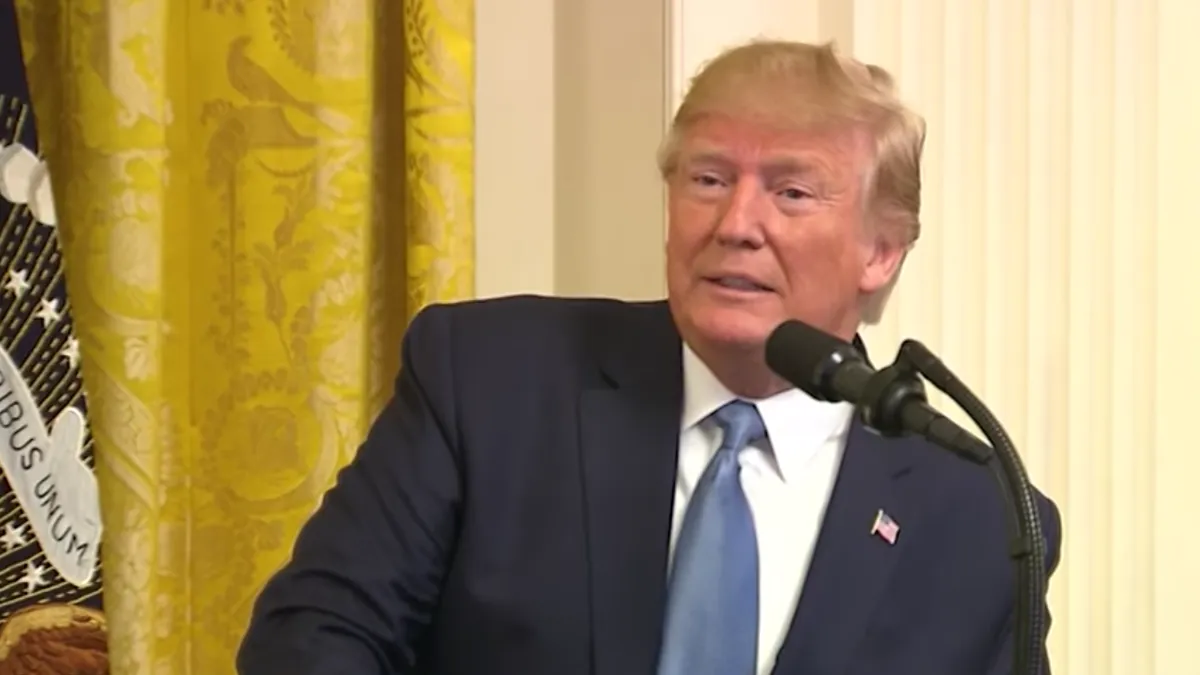Dive Brief:
- The Trump administration on Monday announced it's providing $11 billion to states as part of the CARES Act to help them meet their coronavirus testing goals. While the American Clinical Laboratory Association said it is "encouraged" by White House efforts to bolster state resources, the group contends direct federal funding for labs performing COVID-19 tests is critical to meet the nation's growing demand for high-quality testing.
- ACLA members such as LabCorp and Quest Diagnostics have performed almost 5 million tests to date — a feat enabled by "significant investments" to ramp up capacity, according to President Julie Khani. "Without sustainable funding, we cannot achieve sustainable testing," she said in a statement.
- The call for federal aid comes as LabCorp and Quest are expanding their respective diagnostic and antibody testing capacities. Quest in an update Monday said it has supplies to meet its current target of 50,000 molecular and 200,000 serology tests per day, but warned the global supply chain continues to be strained.
Dive Insight:
According to the White House, about 9 million COVID-19 tests have been completed in the U.S. so far. By ACLA's estimate, its members have performed more than half of those tests. But serving as the "backbone" of America's testing response to the pandemic has come with a steep cost for these commercial labs, the trade group says.
"Across the country, laboratories have made significant investments to expand capacity, including purchasing new platforms, retraining staff, and managing the skyrocketing cost of supplies," Khani said in Monday's statement. "To continue to make these investments and expand patient access to high-quality testing in every community, laboratories will need designated resources."
ACLA in late April sent a letter to HHS Secretary Alex Azar calling on the agency to allocate $10 billion under the Paycheck Protection Program and Health Care Enhancement Act to "support labs' further expansion of testing capacity to fulfill the testing needs of all of the states." A total of $25 billion was provided by the PPPHCE Act to bolster America's COVID-19 testing efforts, but that money has not yet benefited ACLA's members.
Nonetheless, commercial labs like LabCorp and Quest continue to increase the country's overall testing capacity.
LabCorp announced Tuesday it's expanding the nationwide availability of its COVID-19 at-home collection test kit by offering it to individuals who have symptoms, as well as those without symptoms who may have been exposed to the virus. The testing of self-swabbed nasal specimens is available through LabCorp's online service called Pixel.
Initially, the company made the at-home collection test kits available to healthcare workers and first responders. But now LabCorp said it is expanding access in line with Centers for Disease Control and Prevention guidelines and has more than 200,000 test kits available.
Last month, FDA re-issued an emergency use authorization for LabCorp's COVID-19 molecular test, first given in early March, to permit testing of self-swabbed nasal specimens by individuals.
At the same time, both LabCorp and Quest are offering COVID-19 antibody testing and have been expanding the availability of the blood-based tests across the country. Quest announced late Monday it's now offering an IgG antibody test from Ortho Clinical Diagnostics, which received an EUA from FDA on April 24. According to Quest, Ortho's test has reported specificity of 100%, which indicates false positives should not occur.
The company said it is also using IgG antibody tests from Abbott and Euroimmune that have received EUAs with the capacity to perform about 1.4 million tests per week.
FDA last week toughened its requirements for coronavirus antibody tests amid questions about the accuracy of some tests already on the market that had not undergone agency review. Under the revised policy, test manufacturers are required to submit an EUA request with validation data within certain timeframes.
One such test promulgated by BD, developed and manufactured by partner BioMedomics, had been available through the medtech since late March. However, an FDA spokesperson told MedTech Dive on Tuesday that since the agency updated its antibody testing policy on May 4, BioMedomics had "voluntarily withdrawn" its test.
In a statement provided to MedTech Dive, a BD spokesman said the company has "suspended distribution" of BioMedomics' current antibody test. "BioMedomics has completed development of a second generation of the test and is currently coordinating validation activities," the spokesperson said, adding that BioMedomics plans to submit a new EUA application once that validation testing is complete.












